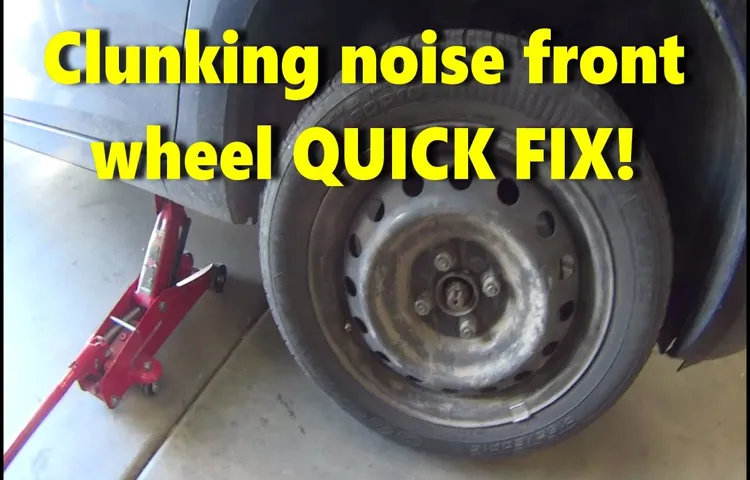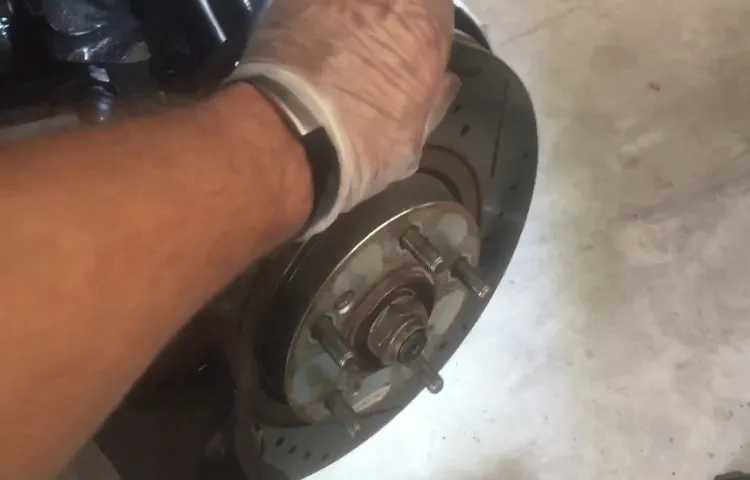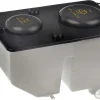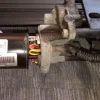Have you ever been driving down the road and suddenly hear a scraping noise coming from your tire? It can be quite alarming, especially if you don’t know the cause of the sound. There are several reasons as to why your tire may be making a scraping noise, and it isn’t always a sign of a major issue. However, it’s important to diagnose and resolve the problem before it leads to more significant damage.
One of the most common causes of a scraping noise from a tire is a worn brake pad. As brake pads wear down, they can begin to make a scraping noise as they rub against the rotors. However, this sound typically only occurs when you apply your brakes and should stop once you release them.
If the scraping noise continues even when your brakes aren’t applied, there may be another issue at play. Another possible cause of a scraping noise is a wheel hub issue. When a wheel hub becomes worn or damaged, it can create a scraping or grinding noise as the wheel turns.
This can eventually lead to performance issues and even cause your tire to fall off if left unaddressed. Lastly, a tire itself can become damaged and cause a scraping noise. If you hit a curb or pothole, for example, you may damage the tire’s sidewall or tread.
This type of damage can result in a scraping noise as the tire rotates. In conclusion, a scraping noise coming from your tire can be an indicator of several potential issues. It’s important to get the issue diagnosed and resolved before it leads to further damage and potential safety hazards.
Keep an ear out for any unusual noises, and make sure to address them promptly.
Table of Contents
Possible Causes
If you’re hearing a scraping noise coming from your tire, there could be several possible causes. One of the main reasons your tire might be making a scraping noise is due to something stuck in the tire treads. Rocks, debris, and even nails can get lodged in the treads, causing that dreaded noise.
Another possible cause is that your brake system might be malfunctioning. Worn brake pads or rotors can make a scraping noise as your car moves. Additionally, if your wheel bearings are worn out or damaged, they can also cause a scraping noise.
A failing CV joint may cause a clicking noise, but if it has progressed enough it could start grinding, creating a low-pitched scraping noise. Any of these issues can cause damage to your tire if left unaddressed, so it’s important to have the problem diagnosed and repaired by a professional mechanic as soon as possible to avoid any further issues or safety risks on the road.
Worn brake pads or rotors
Worn brake pads or rotors can be a safety hazard while driving as they can reduce braking efficiency and increase stopping distances. There can be several possible causes for worn brake pads or rotors. One of the most common reasons is regular wear and tear on the brakes.
Over time, the friction material on the brake pads can wear down, thinning the pads and reducing their effectiveness. Similarly, overuse of the brake system can cause heat damage, warping, and cracking to the brake rotors, leading to their deterioration. Another possible cause is driving styles that are hard on the brakes, such as frequent stop-and-go traffic or downhill driving.
It’s important to keep an eye on your brake pads and rotors and have them regularly inspected and replaced by a professional mechanic to ensure your safety and the safety of others on the road. Neglecting worn brakes can result in more serious damage and costly repairs in the long run. Take care of your brakes and give yourself the peace of mind that comes with reliable stopping power.

Loose lug nuts
“Loose lug nuts” Loose lug nuts can be a nightmare to deal with as they can cause accidents and damage to your vehicle. But what causes lug nuts to become loose? There are a few possible reasons. One is that the lug nuts were not tightened enough during the installation process.
Another possible cause is that the lug nut threads are worn out or damaged, making it difficult for the nut to remain secure. Additionally, over time, vibrations and rough driving conditions can cause the lug nuts to loosen. To prevent this issue, it’s important to regularly inspect your lug nuts to ensure they’re properly tightened and that the threads are in good condition.
If you notice any issues, don’t hesitate to take your vehicle to a professional mechanic for an assessment. Remember, loose lug nuts are a safety hazard and can cause serious harm to you and other drivers on the road.
Damaged wheel bearing
If you’re experiencing a rumbling noise and a slight vibration in your vehicle, there’s a good chance that you have a damaged wheel bearing. These bearings are responsible for supporting the weight of your car and allowing your wheels to spin freely, so when they’re damaged, it can lead to serious problems and potentially even accidents. There are several potential causes of damaged wheel bearings, including improper installation, lack of lubrication, excessive wear and tear, and impact damage.
No matter the cause, it’s important to address the issue as soon as possible to avoid further damage and unsafe driving conditions. If you suspect that your wheel bearings may be damaged, it’s best to have a mechanic diagnose the problem and take appropriate measures to repair or replace the affected parts. Don’t ignore the signs of a damaged wheel bearing – take action to keep yourself and others on the road safe.
Stuck rocks or debris
One potential cause of stuck rocks or debris within a rock formation is the natural process of erosion. Over time, weather and water can wear away at the surface of rocks, creating small cracks and crevices. In turn, this can lead to the buildup of loose rock fragments and other debris within the formation.
Alternatively, human activity such as construction or mining can also displace rocks and cause them to become stuck. Regardless of the cause, once rocks or debris become lodged within a formation, it can be challenging to remove them without causing further damage. Expert geologists and landscapers may utilize specialized tools and techniques to dislodge stuck rocks and debris, but this process can be time-consuming and potentially dangerous.
Therefore, it is essential to take care when conducting activities near rock formations to avoid causing damage or getting debris stuck.
Misaligned wheels
Misaligned wheels can cause a whole host of problems, but what actually causes them in the first place? One possibility is that the wheels were not properly aligned during installation or maintenance. Another possibility is that the suspension system has become worn down and can no longer keep the wheels aligned properly. Additionally, hitting a curb or pothole can cause the wheels to become misaligned.
Over time, this can lead to a variety of issues, such as uneven tire wear, reduced fuel efficiency, and poor handling. So, if you notice that your car is pulling to one side or you have to constantly adjust the steering wheel to keep it straight, it may be time to get your wheels checked and realigned. By doing so, you can improve the overall safety and performance of your vehicle.
What to do
If you hear a scraping noise coming from your tire, it’s important to figure out why as soon as possible. One of the main reasons for this sound is worn brake pads. When your brake pads are very thin, they can scrape against the rotor, causing a scraping noise.
Another possibility is that a stone or other debris got stuck in the tire treads. If this is the case, removing the debris should solve the problem. In some cases, a warped rotor can cause tire scraping too.
If this happens, you’ll need to replace the rotor. Regardless of the cause, it’s always best to have a mechanic inspect your tire to determine the issue and prevent any potential safety hazards. Don’t ignore a strange noise coming from your tire – it’s always better to be safe than sorry.
Inspect your tires and wheels
As a responsible car owner, inspecting your tires and wheels should be a regular part of your routine maintenance. After all, they’re what keeps you safely on the road. First, check the tire pressure and make sure it’s in line with the manufacturer’s recommendations.
Low tire pressure can cause uneven wear or even a blowout. Don’t forget to check the tread depth too! Without enough grip, it can be hard to stop your vehicle in an emergency. Look for cracks, punctures, and bulges on the tires, as they can be signs of damage that may compromise your safety.
Additionally, make sure that the wheels are tightly secured and free from any visible damage. Keeping your wheels and tires in good condition helps ensure your safety on the road and prolongs their lifespan, saving you money in the long run. Don’t hesitate to take your car to a professional for a checkup if you’re unsure about what to look for or need maintenance.
Remember, safe driving starts with your tires and wheels.
Check lug nuts and wheel bearing
When it comes to maintaining your vehicle, one of the most important things you can do is regularly check your lug nuts and wheel bearings. Not only can neglecting this task lead to dangerous driving conditions, but it can also cause excessive and expensive wear and tear on your car’s tires and suspension system. So, what should you do to ensure that your lug nuts and wheel bearings are in proper working order? First, set aside some time to inspect your wheels.
Look for any visible signs of damage or wear, and ensure that your lug nuts are tight and secure. If you notice any looseness or wobbling, it may be a sign that your wheel bearings are worn out and need to be replaced. If you’re not sure what to look for or how to perform these checks properly, don’t hesitate to take your vehicle to a trusted mechanic.
They can provide you with a comprehensive inspection and repair plan, so you can rest assured that your vehicle is in optimal condition for safe driving. In conclusion, checking your lug nuts and wheel bearings should be a regular part of your vehicle maintenance routine. By taking the time to do so, you can avoid potential safety hazards and keep your car running smoothly for years to come.
Remember, prevention is key when it comes to maintaining your vehicle’s health and longevity.
Get your brakes checked by a mechanic
Brakes are an essential component of any vehicle, and it’s important to keep them in top condition to ensure safe driving. To get your brakes checked by a mechanic, the first step is to find a trustworthy and reliable mechanic in your area. Look for reviews and recommendations from friends and family to find the best mechanic that suits your needs.
Once you’ve found a mechanic, schedule an appointment to have your brakes checked. During the inspection, the mechanic will check the brake pads, rotors, brake fluid, and other components to ensure they are in good condition. If any issues are found, the mechanic will recommend the necessary repairs or replacements.
It’s important to follow through on these recommendations to ensure your brakes stay in top shape. Neglecting brake issues can lead to serious accidents, so it’s best to address any problems as soon as they arise. Don’t hesitate to get your brakes checked by a professional if you notice any unusual noises or issues with your braking system.
Your safety on the road depends on it. Remember, a well-maintained braking system can be the difference between life and death. So, take the time to ensure your brakes are functioning properly.
Consult a mechanic for misaligned wheels
Misaligned wheels can cause a lot of problems and may even pose dangers to drivers and passengers alike. If you suspect that your car’s wheels are out of alignment, don’t take chances. The best thing to do is to consult an experienced mechanic who can perform a proper inspection and make necessary adjustments.
A misaligned wheel can cause excessive wear and tear on tires, and may even cause your vehicle to pull to one side or the other while driving. This isn’t just annoying, but also potentially hazardous. A mechanic can also help you determine the root cause of wheel misalignment, such as uneven tire wear, potholes, or even a minor accident.
Don’t compromise your safety and that of your passengers. Consult a mechanic as soon as possible to ensure that your wheels are aligned correctly and your car is ready to hit the road safely.
Conclusion
In conclusion, your tire is making a scraping noise because it wants to add some rhythm and melody to your daily commute. It’s like a DJ scratching a record, except in this case, your tire is scratching the road. So, sit back and enjoy the musical journey of your car’s new hit single – Tire Scrape Symphony! But on a serious note, it could indicate tire wear, alignment issues, or brake problems.
So, it’s advisable to get it checked out by a professional before hitting the road again.”
FAQs
What are the possible reasons for a tire to make a scraping noise?
There can be multiple reasons for a tire to make a scraping noise, such as worn-out brake pads, warped rotors, or loose wheel bearings.
How can I identify if my tire is making a scraping noise?
You can identify a scraping noise by listening carefully to the sound produced by the tire. It is typically a rhythmic sound that changes with the speed of the vehicle.
Is it safe to drive when the tire is making a scraping noise?
No, it is not safe to drive with a tire that is making a scraping noise. It may indicate that something is wrong with the brake system, which can lead to accidents.
Can a tire pressure issue cause a scraping noise?
No, a low tire pressure issue does not cause a scraping noise. However, an overinflated tire can cause tread wear, leading to a scraping noise.
How much does it cost to fix a tire that is making a scraping noise?
The cost of fixing a tire that makes a scraping noise depends on the underlying issue. Worn-out brake pads may cost around $100-$300 to replace, while a faulty rotor may cost around $400-$600.
How often should I check my tires for scraping noises?
You should check your tires for any unusual noises, including scraping noises, every time you fill your gas tank or at least once a month.
Can I fix a tire making a scraping noise by myself?
It is not recommended to fix a tire making a scraping noise by yourself, especially if it’s related to the brake or wheel bearing. It’s advisable to take the vehicle to a professional mechanic for an inspection.



